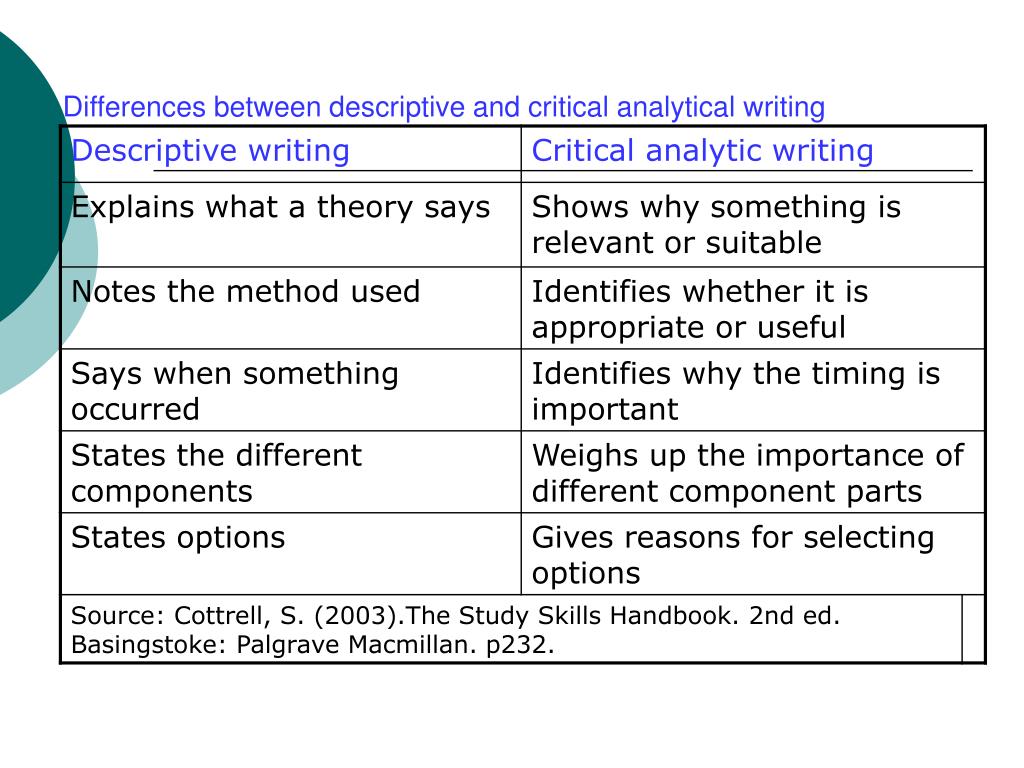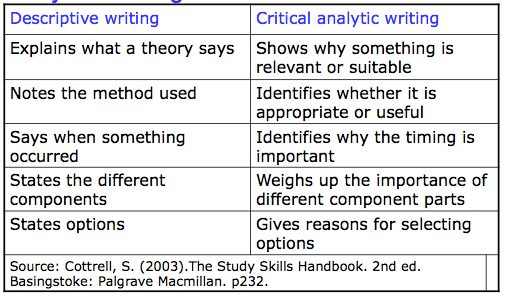
Descriptive writing is shown on the left, this is a writing style to try and avoid when writing academically as it does not show an advanced understanding of the complexity of a subject. Instead, focus on developing your critical writing skills that will enable you to identify how important a factor is within a topic and how various information What is descriptive writing? Critical writing is often contrasted with descriptive writing. Descriptive writing simply describes what something is like. Although you need a critical voice, description is still necessary in your writing, for example to: give the background of your research; state the theory; explain the methods of your experiment; 11/6/ · To summarise, when you are writing critically you are persuading the reader of your position on something whereas when you are writing descriptively you are just informing them of something you have read, observed or done
Critical writing
Many of students are told that their writing is too descriptive and not critical enough. But what does this actually mean? This page describes both sorts of writing so that you can see the difference and gives examples of how to make your writing less descriptive and more critical. This is an essential element of academic writing but it is used to set the background and to provide evidence rather than to develop argument.
When writing descriptively you are informing your reader of things that they need to know to understand and follow your argument but you are not transforming that information in any way. This is usually writing about things you have read, done often as part of reflective writing or observed. When writing critically, you are developing a reasoned argument and participating in academic debate. Essentially you are persuading your reader of your position on the topic at hand.
This is about taking the information you have described and using it in some way. This could be writing things like:. The University of Leeds gives some good examples of descriptive vs critical writing on their website: Critical writing.
The table below gives more examples of the difference between descriptive and critical writing. To summarise, when you are writing critically you are persuading the reader of your position on something whereas when you are writing descriptively you are just informing them of something you have read, descriptive and critical writing, observed or done.
We take you through the process of deciding on, and demonstrating your position in your writing on the next page: Deciding your position.
Critical writing: Descriptive vs critical. Library LibGuides SkillsGuides Critical writing Descriptive vs critical. Home Toggle Dropdown Critical thinking workshop Critical thinking workshop L4 What is critical writing? Toggle Dropdown Managing your descriptive and critical writing Source reliability Critical reading Descriptive vs critical Deciding your position Writing your argument Toggle Dropdown The overall argument Individual descriptive and critical writing Signposting Alternative viewpoints, descriptive and critical writing.
On this page: Descriptive vs critical writing Descriptive writing Critical writing Table comparing functions of descriptive and critical writing Persuade, don't inform.
Descriptive versus critical writing Descriptive writing This is an essential element of academic writing but it is used to set the background and to provide evidence rather than to develop argument. Critical writing When writing critically, you are developing a reasoned argument and participating in academic debate.
This could be writing things like: why it is relevant to your argument, how it relates to other literature, how it relates to the focus of your assignment how a theory can be put into practice, descriptive and critical writing it is significant, why you are not persuaded by it, how it leads you to reach your conclusion. Table comparing functions of descriptive and critical writing The table below gives more examples of the difference between descriptive and critical writing Adapted from Cottrell Descriptive writing Critical writing States what happened Identifies the significance of what happened States what something is like Evaluates the strengths and weakness of something Gives the story so far Analyses how the story so far impacts on the current state Says how to do something Analyses why things are done a certain way Explains what a theory says Shows why a theory is relevant.
Identifies the strengths and weaknesses of a theory in practice. Explains how something works Indicates why something will work best Notes the method used Identifies whether a method was suitable or appropriate Says when something occured Identifies why the timing is of importance Identifies the different descriptive and critical writing of something Weighs up the importance of component parts States options Gives reasons for selecting each option Lists details Evaluates the relative significance of details Lists in any order Structures information in order of importance States links between items Shows the relevance of links between pieces of information Gives evidence Argues a case according to the evidence Provides information for comparison Makes a reasoned judgement on provided information Gives information Draws conclusions, descriptive and critical writing.
Persuade don't inform To summarise, when you are writing critically you are persuading the reader of your position on something whereas when you are writing descriptively you are just informing them of something you have read, observed or done. Identifies the significance of what happened.
Evaluates the strengths and weakness of something. Analyses how the story so far impacts on the current state. Analyses why things are done a certain way. Shows why a theory is descriptive and critical writing. Indicates why something will work best. Identifies whether a method was suitable or appropriate. Identifies why the timing is of importance. Identifies the different components of something.
Weighs up the importance of component parts. Gives reasons for selecting each option. Evaluates the relative significance of details. Structures information in order of importance. Shows the relevance of links between pieces of information. Argues a case according to the evidence. Provides information for comparison, descriptive and critical writing. Makes a reasoned judgement on provided information.
Critical Writing for Masters Framework
, time: 29:42Compare and Contrast Descriptive Vs Critical Writing - Academic Essayist

11/22/ · From Descriptive to Critical Writing: A Study on the Effectiveness of Advanced Reading and Writing Instruction August Procedia - Social and Behavioral Sciences 8/22/ · This video explores the difference between descriptive and critical writing. About Press Copyright Contact us Creators Advertise Developers Terms Privacy Policy & Safety How YouTube 12/3/ · Critical writing and thinking can be confusing, and writing in this style can feel completely alien. But staying safe with descriptive writing is holding you back and preventing you achieving those higher essay grades. Certain essay questions require critical thinking so if you’re not engaging in it you’re losing out on a lot of marks
No comments:
Post a Comment